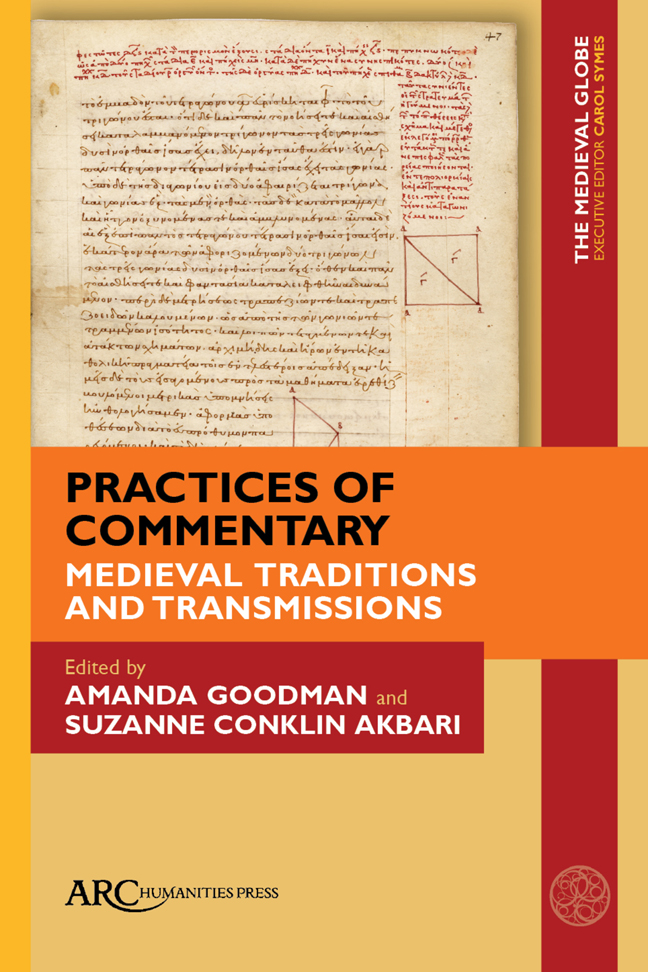Book contents
- Frontmatter
- Contents
- List of Illustrations
- Introduction: Commentary at the Crossroads
- Graeco-Roman Commentary Beyond Alexandria: Problems and Prospects
- From Plane to Space: The Narrative Arc of a Byzantine Mathematical Manual
- Periodization in the Sunni Qur'an Commentary Tradition: A Chronological History of a Genre
- On the Practice of Autocommentary in Sanskrit Sources
- Oral Commentaries and Scholarly Debates in Sanskrit Philosophy
- On the Nature of Chinese Buddhist Scriptural Exegesis: Observations on the Commentaries of Chengguan, Woncheuk, and Other Sui-Tang Exegetes
- The Mise-En-Page of a Sino-Tibetan Dunhuang Manuscript: Yuanhui's Commentary on the Laṅkāvatārasūtra
- Commentary and Multilingualism in the Ottoman Reception of Texts: Three Perspectives
- Index
Periodization in the Sunni Qur'an Commentary Tradition: A Chronological History of a Genre
Published online by Cambridge University Press: 17 February 2024
- Frontmatter
- Contents
- List of Illustrations
- Introduction: Commentary at the Crossroads
- Graeco-Roman Commentary Beyond Alexandria: Problems and Prospects
- From Plane to Space: The Narrative Arc of a Byzantine Mathematical Manual
- Periodization in the Sunni Qur'an Commentary Tradition: A Chronological History of a Genre
- On the Practice of Autocommentary in Sanskrit Sources
- Oral Commentaries and Scholarly Debates in Sanskrit Philosophy
- On the Nature of Chinese Buddhist Scriptural Exegesis: Observations on the Commentaries of Chengguan, Woncheuk, and Other Sui-Tang Exegetes
- The Mise-En-Page of a Sino-Tibetan Dunhuang Manuscript: Yuanhui's Commentary on the Laṅkāvatārasūtra
- Commentary and Multilingualism in the Ottoman Reception of Texts: Three Perspectives
- Index
Summary
PERIODIZATION, DESPITE ALL the inherent problems attending any segmenta-tion of historical developments, is unavoidable. It is as much a statement about our present as about the importance we confer on the past. Periodization is usually the result of a lineage of scholarship and disciplinary legitimacy. Turning points, cleavages, chasms, new beginnings, restorations are all embedded in the seemingly sterile time-line of any discipline. A timeline is history distilled. Even constant complaints about the inadequacy of periodization act to entrench the status of the concerned field, by forcing more refinement on the picture. This past, periodization declares, is worthy of reflection and delineation. Periodization is thus, ironically, the most profound site of interpretative historical reflection. A genre or a discipline with no historical landmarks is hardly an entity, even if it is historically undeniable. Behind all this effort lies a more ideological framework, a developmental notion of history, not just the absence of stasis, but the marching of history to a certain fulfilment.
Qur’an commentary tradition is a peculiar discipline in this regard. It has a bipolar history, a periodization that is concerned with two ends: its origins at the beginning of the written religious history of Islam; and its current modernity, after the encounter with modern Europe. Of the vast middle we know considerably less. The vast middle, however, is an ocean, made up of more than a millennium of writing. More significantly, the absence of a grand narrative encompassing this millennium makes any statement about any exegete or commentary untethered. One has no grid to use as reference, or to rebel against. This article attempts to chart a periodization of the genre of Qur’an commentary that reflects the archival material and the disciplinary history of its pro-duction. The argument is simple: without a periodization, the study of the history of Qur’an commentary will remain fragmentary, for its very lack creates historical vacuums that leave any study truncated and historically ungrounded, no matter how meticulous. Periodization is, mirabile dictu, both the end result of scholarship and the beginning of scholarship. One needs a narrative to understand the particular. So unless we offer a ten-tative outline of Qur’an commentary's periodization, we will continue to misjudge each and every phase or development. The monographic approach, the foundation of serious scholarship, paradoxically reconfirms the segmentation of a field into discrete disparate names and titles. Even a flawed narrative is better than this state.
- Type
- Chapter
- Information
- Practices of CommentaryMedieval Traditions and Transmissions, pp. 49 - 64Publisher: Amsterdam University PressPrint publication year: 2023

